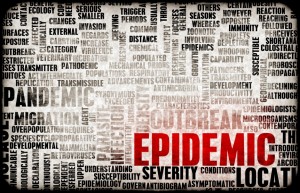 Infectious diseases have been at the heart of public health through human history, impacting health care delivery and societal practices. During crisis time health care workers and civic leaders scramble to limit disease spread with a best guess at containment, including the most recent 21-day quarantines for health care workers returning from caring for Ebola victims in Africa.
Infectious diseases have been at the heart of public health through human history, impacting health care delivery and societal practices. During crisis time health care workers and civic leaders scramble to limit disease spread with a best guess at containment, including the most recent 21-day quarantines for health care workers returning from caring for Ebola victims in Africa.
It’s hard to imagine the fear and lack of understanding that must have accompanied the Plague in 1346-53 that killed millions of people as it spread from Asia through Europe. Even in 1918, less than 100 years ago, efforts could not prevent the deaths of 50 million people worldwide from the Spanish flu pandemic. The epidemiology of this global flu spread is still being studied today.
The current Ebola outbreak response demonstrates the ability of modern medicine to understand the biology of the virus and implement steps to limit the spread of deadly disease. Society relies on public health officials to act with knowledge about how the virus is spread, what protective gear will prevent human exposure, and when infected people become contagious.
Data may be changing the way we respond to infectious disease outbreaks. A 2012 article, “Digital Epidemiology” highlights the disease prevention opportunity created by the explosion of personal data devices. Traditional epidemiology is built on data gathered through public health entities: required reporting of disease to the health department or voluntary reporting to disease registries. In times of crisis, this data is gathered through head counts and surveys, with the inherent time lag and inaccuracies of those techniques. Today digital epidemiology researchers are investigating the power of data collected in everyday activities of individuals, something as simple as using your cell phone.
Personal data and computational power
Digital devices generate digital data, which means today we have digital communication data running out of our ears. In addition to making calls, people publicly share data every second through tweets, posts and messages, so it is possible to know not only where someone is located and where they are going, but also to know the context of their behavior. An example provided in “Digital Epidemiology” shows how data can illuminate a geographic hotspot where people are refusing vaccination, which creates a high-risk location for infectious disease outbreak.
Personal data can also be used to better understand disease transmission. Digital epidemiology research can track spatial movement and face-to-face proximity data that can later be combined with infectious disease patterns to show transmission points. This “digital trace data” clarifies routes of infectious disease transmission.
Digital epidemiology is made possible not only by the global integration of digital communication devices, but also by the development of computational power to manage ginormous data sets. We’re talking Watson-size, computer-cluster big for both data storage and data analysis, including data mining techniques to pluck significant pieces from the data mass. This new field of study has generated algorithms and processes to create global public health data such as human mobility patterns during times of disease crisis.
The public health application of IT
The website Flowminder.org provides examples of the real-world use of digital epidemiology. The website’s founder, Linus Bentsson from the Karolinska Institute, describes digital epidemiology as “the public health application of information technology.” During the current Ebola outbreak cell phone data in West Africa has been used to model the movement of people. This data provides real-time and even predictive information for preventive and relief efforts.
Digital epidemiology is not confined to anticipating and describing the transmission patterns of infectious diseases. In the U.S. and other developed countries, chronic diseases including diabetes, cardiovascular disease, and pulmonary disease are the main public health issues. Digital data can be used to identify clusters of risk behaviors such as poor diet, smoking, and low exercise to improve the utilization of preventive public health resources in these areas.
In medicine and in everyday life ubiquitous devices are collecting a treasure trove of data. Powerful Big Data storage and analysis resources have enabled the birth of the new field of digital epidemiology. Harnessing this data may hasten the response to infectious disease and make epidemics and pandemics history.
How do you feel about your cell phone data becoming part of public health? Are we facing a human decision about privacy and public good over your phone call and travel patterns? Post a comment with your thoughts.


Leave a Reply